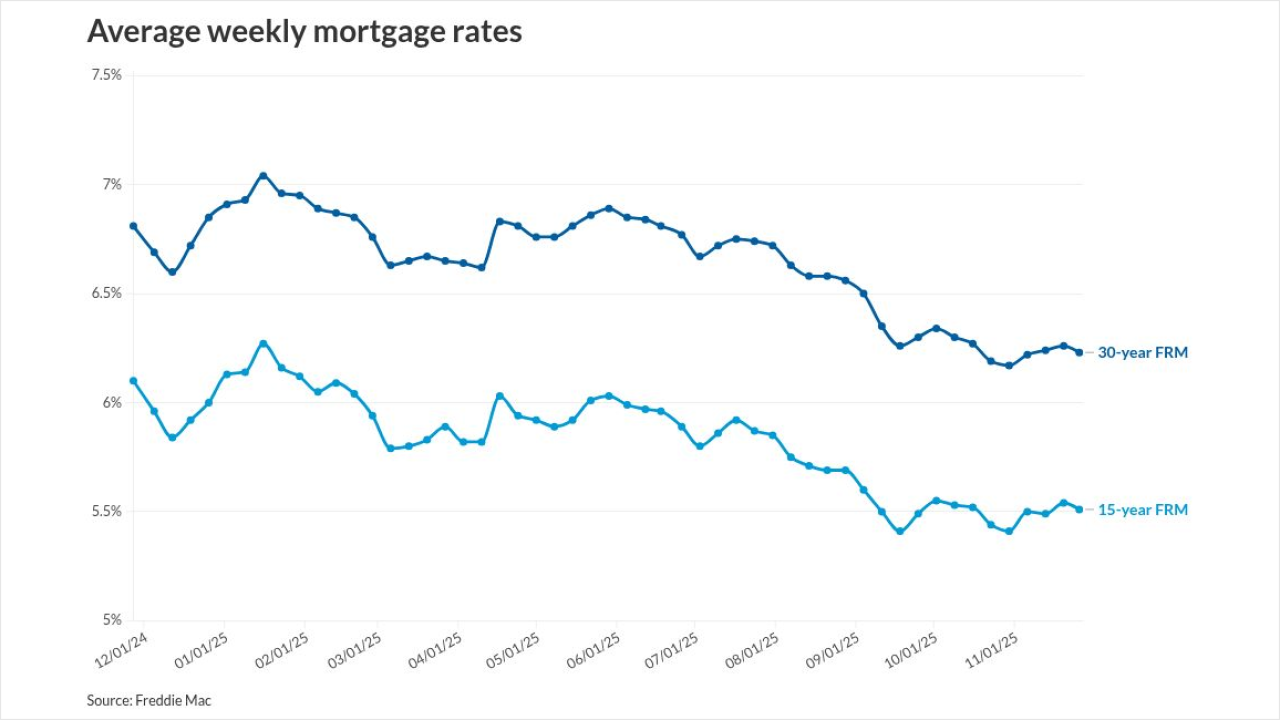Banks, mortgage lenders and brokers could easily end up paying hundreds of millions of dollars on refinanced loans whose fixed rates have already been locked in to bolster the finances of Fannie Mae and Freddie Mac.
A
Lenders face the prospect of millions of dollars in lower profits, and potentially losses, for an extended period because the fee will be collected on loans in which interest rates already have been locked in and cannot be adjusted. Lenders typically lock in interest rates for 45 or 60 days to ensure a borrower gets a rate that does not change during the closing process, meaning the fee couldn't be passed along to consumers for at least a month or two.

The fee, approved without prior notice by the Federal Housing Finance Agency, which oversees Fannie and Freddie, is set to be collected starting Sept. 1.
"The way they did this is very, very damaging to banks and other mortgage bankers and brokers who have loans in the pipeline,” said Scott Buchta, head of fixed-income strategy at Brean Capital. "In the first month, the bulk of the fee will come out of the pockets of bankers and brokers that locked in a lot of loans.”
The so-called adverse market fee will cost originators an additional $1,400 or so for a $280,000 loan. The fee is likely to reduce profits for mortgage lenders given that the net profit per loan in the first quarter was $1,600, according to the Mortgage Bankers Association.
Still, ultralow interest rates have led to a wave of refinancing that has sent loan officer commissions skyrocketing. Retail loan officers earned an average of $24,200 a month in commissions in the second quarter, according to LBA Ware, a Macon, Ga., mortgage software firm that tracks loan officer compensation. By contrast, retail loan officers' monthly commissions in the second quarter of 2019 was $15,190 a month. Loan officer compensation plans are created annually or semiannually and cannot be changed on a per-loan or per-month basis, said Lori Brewer, LBA Ware's chief executive.
The Biden administration once again extended the pause on student loan payments enacted to help borrowers during the COVID-19 pandemic, this time through the end of August.
The two states' combined plans amount to over $1.5 billion of the Homeowner Assistance Fund included within the American Rescue Plan Act , which was passed a year ago.
An uptick in pandemic-related payment suspensions reflecting new or restarted plan activity previously occurred as the omicron variant spread, but activity has since subsided.
Buchta said mortgage lenders could end up paying up to $500 million in fees on their locked pipelines that cannot be passed on to consumers.
Ron Haynie, senior vice president of mortgage finance policy at the Independent Community Bankers of America,
"Instead of listing the half-point fee on a disclosure statement, they will raise the rate to cover the fee, and borrowers will pay for it over time,” Haynie said. "If you raise the rate, you’re raising the payment amount, so it impacts the borrower's monthly cash flow. There is a cost and borrowers will notice it.”
The FHFA did not give a reason for the fee. Fannie said in a letter to lenders that it would be implementing the fee “in light of market and economic uncertainty resulting in higher risk and costs.”
Larry Platt, a partner at Mayer Brown, said the fee made little sense because borrowers who refinance are less of a risk to Fannie or Freddie since their monthly mortgage payment typically drops by several hundred dollars.
“Borrowers are lowering their interest rates which can’t increase risk to the GSEs,” Platt said, noting that there are “a lot of unanswered questions” about the fee and why it was imposed during a pandemic, when the Federal Reserve has kept interest rates low, helping to put more cash in their pockets.
“It definitely has an adverse effect on the industry, particularly lenders that have already made commitments ... they’re going to lose a lot of money on this,” Platt said "The general consensus is that the fee is a pretext designed to skim off the top to increase the capital of the GSEs."
The fee also comes at a time when home mortgage delinquencies are rising and the economic fallout from the coronavirus pandemic remains uncertain.
In the second quarter, the total delinquency rate on conventional loans backed by Fannie and Freddie rose to 6.7% — the highest rate since 2012, according to the MBA. Roughly 5% of loans backed by Fannie and Freddie were in forbearance in the second quarter due to the coronavirus.
Robert Broeksmit, the MBA’s chief executive, said the fee is bad for homeowners and the economic recovery. The MBA is urging the FHFA to withdraw the fee, which Broeksmit called an “ill-timed, misguided directive.”
“At a time when the Federal Reserve is purchasing $40 billion in agency MBS per month to help reduce financing costs for mortgage borrowers to support the broader economy, this action raises those costs and undermines the Federal Reserve's policy,” Broeksmit said in a statement.
Lawmakers are already pushing back against the fee, questioning how it was decided, and if it conforms to the GSEs' charters.
Sen. Sherrod Brown of Ohio, the ranking Democrat on the Senate Banking Committee, sent a letter Wednesday signed by 15 Senate Democrats to FHFA Director Mark Calabria asking him to respond to several questions by Aug. 26.
“This sudden additional charge will affect loans currently in the refinance process and could cause both confusion and increased costs for homeowners,” the letter states. "The Enterprises and FHFA have offered no explanation for this change. We would therefore like to understand the Enterprises’ request, and FHFA’s approval, to raise costs on refinance transactions."
The fee comes after new liquidity requirements imposed by the FHFA on Fannie and Freddie
The FHFA has not issued any public guidance on the liquidity requirements beyond disclosures by Fannie and Freddie, a similar tack taken with the adverse market fee. But many in the industry blame Calabria, who came under fire earlier this year for not providing liquidity to nonbank mortgage servicers.
Dave Stevens, CEO of Mountain Lake Consulting and a former head of the Federal Housing Administration, said Calabria is essentially "robbing from America's homeowners to support [GSE] shareholders."
"The Fed has been driving mortgage rates lower to help the economy and consumers," Stevens said. "Yet Calabria and the FHFA are skimming all of that into revenues that can help him achieve his goal of recapitalization."
In May the agency
The MBA and others are lobbying to get the fee rescinded or have it take effect at a later date. Some said that was unlikely to happen given that the FHFA
“Calabria doesn’t tend to back off. He didn’t back off on the fee for forbearance," Platt said. "He doesn’t really have any accountability, unless there’s a change in administration, and he has a single focus of getting the GSEs out of conservatorship. It’s something consumers are going to have to live with.”







